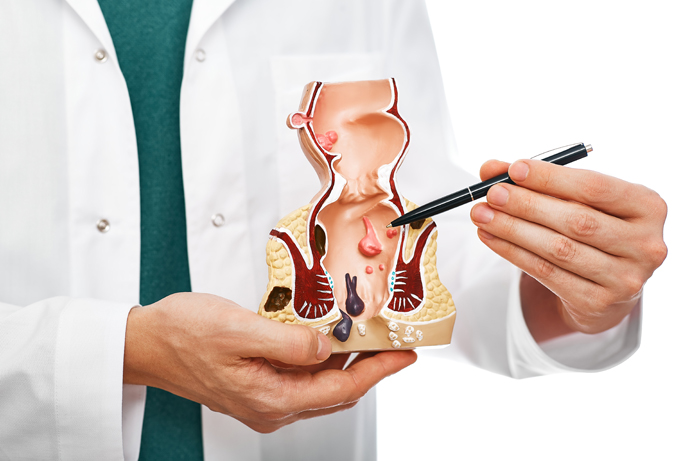Anal Fissures Treatment & Surgery in Koramangala, Bangalore
Anal fissures are tears or cuts in the wet tissue that lines your anus called the mucosa. These fissures usually form during constipation when you are trying to pass your stool. Anal fissures are very common and heal within four to six weeks.

What Are Anal Fissures?
An anal fissure is a tear or a cut in the wet tissue that lines your anal canal called the mucosa.
Anal fissures occur when you are trying to pass dry, hard stools, common during constipation. This puts a lot of pressure on the mucosa, which causes it to tear and form a fissure.
Anal fissures are common across all age groups and can be easily treated with a few at-home treatments.
Symptoms of Anal Fissures
You’re probably wondering how you’d recognize these symptoms because the tear is in a place that you cannot see. But it’s pretty simple. There are a few telltale signs that will alert you to the fact that you might have anal fissures. They are:
- Diseases such as Irritable Bowel Syndrome or Crohn’s Disease commonly cause anal fissures
- Severe pain when passing stools
- Blood during or after bowel movements
- A feeling of tightness in your anal muscles
- Formation of lumps near the skin of your anus
Causes of Anal Fissures
Anal fissures are formed when your anal canal is put under extreme pressure or stretched, causing a rip or tear to form, making it uncomfortable and painful. Anal fissures are caused by the following:
- Constipation
- Frequent bowel movements
- Giving birth
- Anal cancer
- HIV
- Anal infections
- Anal tumors
When to See a Doctor?
When do you know that it is time to visit your doctor? If you experience pain even hours after passing stool, if your anal canal itches or burns, notice blood in your stools, then you should visit the doctor in a hospital near you.
Request an appointment at Apollo Spectra
Call 1860 500 2244 to book an appointment
Risk Factors Associated with Anal Fissures
A few of these factors might make you more vulnerable to developing anal fissures. They are:
- Diseases such as Irritable Bowel Syndrome and Crohn's Disease
- Constipation
- Anal cancer
- Anal infections
- Intense pressure during childbirth
Complications of Anal Fissures
There are very few complications associated with anal fissures and are usually treatable. They are:
- Anal fissures tend to occur frequently if you have had them once.
- If the fissure does not heal on its own after eight weeks, it is time for further treatment.
- Anal fissures can cause discomfort or pain around your anal sphincter muscle, which requires further treatment.
Prevention of Anal Fissures
Anal fissures are very common and can be easily prevented by drinking lots of water to avoid constipation, regular exercise, keeping the anal area clean, and eating high-fiber food to keep your bowel movements steady and smooth.
How Are Anal Fissures Diagnosed?
Your doctor may first conduct an initial examination of the area near your anus. Then for further analysis, they might carry out a rectal exam to help them confirm their diagnosis.
They may also insert a small, thin tube called the anoscope to help them see the fissure better and understand if the pain is due to fissures or any other disease such as hemorrhoids.
Treatment of Anal Fissures
Anal fissures are common and happen across all age groups. There is nothing to worry about. Usually, anal fissures heal on their own within four to six weeks. But if it persists after eight weeks, it is considered a chronic condition and requires medical intervention.
There is nothing to worry about. Your doctor will suggest a few medications such as pain ointments such as Nitroglycerin ointments to help relieve the pain, high fiber food, and stool softeners to help you heal your anal fissure.
If these measures do not help you after two weeks, your doctor may perform a surgery called anal sphincterotomy that involves making a small cut in your sphincter to help relax your anal muscles.
Conclusion
Anal fissures are tears or cuts in the wet tissue called mucosa surrounding the anal canal. These fissures are caused by hard, dry stools experienced during constipation or diarrhea. They are very common. They are seen across all age groups. These fissures are harmless and usually heal on their own within four to six weeks. If they persist after eight weeks, then further treatment from the doctor is recommended.
Absolutely. Anal fissures are common across all age groups. They usually heal on their own within four to six weeks.
No. Anal fissures neither lead to nor cause colon cancer.
If you experience pain even hours after bowel movements and blood in your stool, then it is time you visit your doctor.
Symptoms
Our Top Specialities
NOTICE BOARD
CONTACT US
CONTACT US
 Book Appointment
Book Appointment


.svg)
.svg)
.svg)
.svg)








